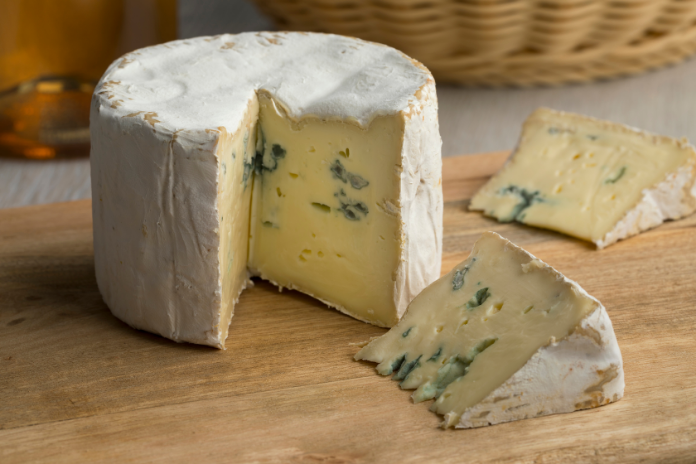Blue cheese is a different kind of cheese that appears blue at some spots. It looks like veins filled with blue color, which can also vary in different shades of blue and green. This cheese can add a much-needed kick to a large variety of dishes.
Nutrition
It is made with mold penicillium and has various specifically cultivated bacteria. It has a distinct color and smell. Thus its use is not very common in households unlike other varieties of cheese. However, it is a much healthier option because of its high nutritional value. 100 grams of blue cheese have around 21 grams of protein and has a high level of calcium. It has a good amount necessary nutrients like fats, sodium, potassium, magnesium, and vitamins. It carries a very low level of carbohydrates and cholesterol. A good 100 grams of blue cheese have around 354 calories and only 75mg of cholesterol.
The fun fact about blue cheese is that it was not invented intentionally rather it was created by accident. It has a funny story behind it. Once a french bread maker was drunk and left a moist cheese on a half-eaten loaf of bread. When he returned, he was surprised to discover the mold covering of bread transformed into a blue cheese.
Types of Blue Cheese
- Danish blue or danablu
- Gorgonzola
- Cabrales
- Stilton
- Roquefort
9 Surprising Health Benefits of Blue Cheese
Good for bones
It has high calcium content. So it is good for bones and it also lowers the risk of osteoporosis.
Maintains heart health
It lowers the risk of cardiovascular diseases and helps in controlling the level of cholesterol. Also helps preventing blood clotting in veins and arteries.
Good source of phosphorus
Not many dishes of our day-to-day lives have a good amount of phosphorus but this food does. Phosphorus is good for teeth and bones. It also helps carrying other vital functions of the body smoothly.
Empowers immune system
It has a large number of vitamins and minerals like vitamins a and d, iron, zinc, and many more. Hence it helps in boosting the immunity of the body.
Boosts memory
It helps in improving the functioning of brain cells. Due to this it improves memory and fights against memory-related problems. It is really good for kids.
Avoids cellulite formation
It avoids the accumulation of fats at one place. Cellulite are formed from the deposition of fats at thighs. So, consumption of blue cheese helps in avoiding the formation of cellulite.
It has anti-inflammatory properties
Inflammation means burning in the stomach due to indigestion. Blue cheese has a lot of anti-inflammatory properties that help to fight against inflammation.
Good for dental health
The good amount of calcium helps in avoiding tooth decay and strengthening teeth. So, it can be said that it’s dental friendly.
It is anti-obesity
Blue cheese has a low amount of fats. Apart from that, it avoids gathering the fats at one place due to which it helps in fighting against obesity.
Research
Research also found out that blue cheese has medicinal properties up to some extent. As it has anti-inflammatory properties so it helps in fighting against a lot of diseases. Unfortunately, now-a-days, due to bad lifestyle and ill eating patterns most of the diseases begins from the stomach itself. This can lead to some serious issues in the after stages.
Blue Cheese in Diet
- Make a blue cheese sauce that can be easily made like other cheese sauces.
- Add it to the top of your pizza and enjoy the flavors of this cheese.
- It goes best with salads. So all you need to do is chop some veggies and top them with some dressing and blue cheese.
- Make a grilled cheese sandwich with your favorite stuffing and blue cheese.
- It works really well as a dip or dressing as well.
- Stuff it in tacos with the rest of the stuffing.
- Goes good with chicken, ham, and omelets.
- It can be stuffed in a quesadillas as well.
Precautions
It some certain types of mold compound. Some compounds are not good for the human body and are formed due to spoilage. This can be toxic and so, one must actively ensure that such things are avoided. The shelf life of approximately 30 days.
Blue cheese doesn’t go well with all types of wine and should be consumed with some specific wines only.
It is usually suggested that its consumption must be avoided during pregnancy. Its making includes the use of unpasteurized milk. This can sometimes increase the risk of listeria poisoning which is highly dangerous for unborn babies.
Apart from all these things, there are no such health concerns related to the consumption of blue cheese.
References
https://www.ncbi.nlm.nih.gov/pmc/articles/pmc5331954/
https://www.ncbi.nlm.nih.gov/pmc/articles/pmc6927928/













